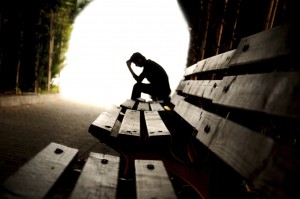Hidden Depression Among Us
 You may know someone who is depressed and not know they’re depressed. People expect someone who is depressed to cry a lot, stay in bed all day, mope, or sound like Eeyore from Winnie the Pooh. But depression isn’t always this obvious.
You may know someone who is depressed and not know they’re depressed. People expect someone who is depressed to cry a lot, stay in bed all day, mope, or sound like Eeyore from Winnie the Pooh. But depression isn’t always this obvious.
Some people can totally fake it. They can smile and laugh; they can act like everyone else, even while they are in excruciating emotional pain. Occasionally people who can do this end up killing themselves, and no one can believe it. People who are depressed but act like they are fine may not confide in anyone. Usually they find a way to spend time alone crying or letting down the facade and then go back to acting when they have to be with people. I’ve had clients who lived with their families and only found time to cry after everyone went to sleep, and only in the bathroom. The rest of the time they were acting like someone who wasn’t in pain. On top of the pain they already feel, acting happy is emotionally exhausting, and having this secret is isolating. So, faking it can even increase the depression.
Others funnel their pain into anger and people see them rage, abuse, shame, or react with annoyance or irritation to whatever happens around them. They may or may not themselves know they’re depressed, but others often don’t guess how much devastating emotional pain they are in. People may fear them, despise them, or dismiss them as mean. It is very difficult to feel sympathy for someone who is hurting people, and it is difficult to see their vulnerability, so their depression goes unnoticed.
Still others are addicted to something, and the depression is obscured by the addiction. People with addictions spend most of their time and energy relating to the addiction. They plan to do it, anticipate doing it—these phases excite them and elevate their mood temporarily. Then they use whatever they are addicted to and it boosts their mood. But the thrill wears off, and they are depleted by the effects of the addiction and may also feel remorse or shame, so the depression descends on them, pulling them down like a cement jacket. They begin the cycle again to try to feel better; they plan and anticipate. Their whole life is about running from depression, but it becomes centered around the more dramatic force of addiction, and the depression can be unrecognized. I am not saying that all addicts are driven by depression—depression can also be caused by addiction. But addiction can be a form depression takes that is not easy to identify as depression. I include eating disorders in this category. I also include people who work most of their waking hours.
Depression isolates people. Whether they are hiding from the world in bed, preoccupied with an addiction, pushing people away with anger, or keeping their real thoughts and feelings inside while pretending to be okay, people with depression usually feel very alone.
Depression isolates people. Whether they are hiding from the world in bed, preoccupied with an addiction, pushing people away with anger, or keeping their real thoughts and feelings inside while pretending to be okay, people with depression usually feel very alone. Depression also has a built-in isolating fog quality that makes it very difficult to feel connected to people. Even when people feel safe to express exactly how they feel, it is very difficult for people who haven’t experienced a deep depression to understand how that feels. How can anyone who hasn’t experienced it understand a pain that is as intense as any open-heart surgery without anesthesia, with no cuts or bruises to show? How can anyone who hasn’t experienced it understand the complexity of pain that is not only unbearably intense itself but also complicated by many painful factors like the stigma of mental illness and the confusion of the fact that unlike other illnesses, depression causes behavior changes. People attribute behavior to the moral character of the person, rather than to the illness.
The pain is also complicated by the fact that depression attacks a person’s thoughts and feelings, rather than liver or lungs. Depression can cause a person to think she hates herself or is unhappy in her relationships. It can cause someone to believe everyone would be better off without him, or even that others would be better off dead. It can cause people to feel sad, angry, guilty, numb, or rageful, even when none of this is how they feel when they aren’t depressed.
So what can you do to help people you love who are depressed, if you can’t tell they’re depressed? Ask questions very kindly and listen to the answers very carefully. Empathize with their emotional pain—even if you have to guess at what it might be. Let them know you are there to listen and understand for as long as it takes, and you aren’t taking no for an answer. Of course if you aren’t trustworthy—if you judge them, or talk to others about what they tell you, or interrupt, get impatient, or misunderstand them, then it is better for them to talk to someone who can really listen without any of this. Being a reliable, trustworthy, patient, nonjudgmental listener is the best thing you can do in most cases with someone who is depressed.
A couple of caveats: I am talking about adults—children and teens require some variations. Also, addictions cloud the picture of depression and require their own, very different intervention. Nonjudgmental listening is still essential but may need to be combined with some firm boundary-setting and professional treatment for the addiction.